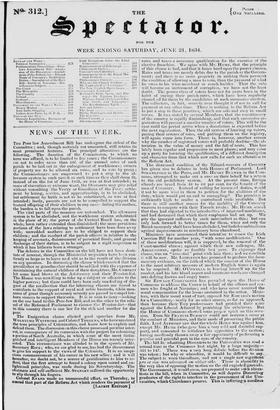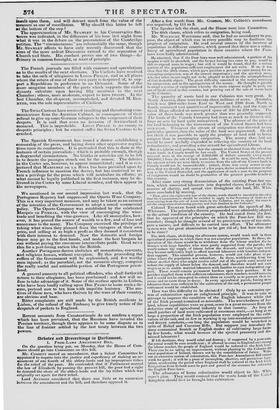NEWS OF THE WEEK.
THE Poor law Amendment Bill has undergone the ordeal of the Committee ; and, though certainly not unscarred, still retains its most prominent features. The principal alterations are the following. The duration of the Commission, to which no term was affixed, is to be limited to five years ; the Commissioners ere not to order more than 50/. of the annual rates of each parish to be laid out in the enlargement of workhouses; owners of property are to be allowed six votes, and to vote by proxy ; the Commissioners are empowered te put a stop to the al- lowance system in each parish at such time as they shall deem fit, instead of on the 1st of June 1835, as was at first intended ; in cases of starvation or extreme want, the Overseers may give relief without consulting 'the Vestry or Guardians of the Poor; settle- ment by hiring, service, and apprenticeship, is to be abolished, but settlement by birth is not to be substituted, as was at first intended; lastly, parents are not to be compelled to support the bastard offspring of their children in any case—failing the mother, the burden is to fall upon the parish.
The vital parts of the measure are untouched. The allowance system is to be abolished, and the workhouse system substituted in the place of it; the power of he Central Board has, on the whole, been rather extended than diminished; the inure pernicious portions of the laws relating to settlement have been done away with; unwedded mothers are to be obliged to support their children; and the conduct of the parish officers in relation to the keeping of accounts, disbursement of parochial funds, and general discharge of their duties, is to be subject to a rigid inspection to which it has hitherto been a stranger.
The debates in the Committee on the bill have not been desti- tute of interest, though the Ministerial majorities have been uni- formly so large as to leave no dsubt as to the result of the division on any question. In diseuseieg the clause which enacted that the grandfather or grandmother should be saddled with the expense of maintaining the natural children of their daughters, Mr. CORBETT hit some hard blows at the Aristocracy and their Pension-list. The House was unwilling to take up a subject so offensive to the higher powers; but there could have been only one feeling of dis- gust at the recollection that the labouring classes are fumed to contribute to the support of royal and noble bastards, while mea- sures of great though necessary severity are passed to compel low- born sinners to support theirown. It is in vain to deny—looking on the one hand to this Poor-law Bill, and on the other to the refu- sal of the Reformed Parliament to cleanse the Pension-list—that in this country there is one law for the rich and another for the poor.
The Emigration clause elicited good speeches from Mr.
WOLRYCHE WHITMORE and Colonel TORRENS, who have mastered the true principles of Colonization, and know how to explain and defend them. The discussion on this clause possessed peculiar inter- est, in consequence of its connexion with the project for colonizing a portion of South Australia, in which some of the most distin- guished and intelligent Members of the House are warmly inter- ested. This circumstance was alluded to in the speech of Mr. Secretary RICE; who, we are glad to see, has had the discernment to give his support to the views of the Colonists. It is an auspi- cious commencement of his career in his new office ; and it will - hereafter, we doubt not, be a source of gratification to him to re- flect,-that the first attempt to founcla colony upon sound and en- lightened principles, was made during his Secretaryship. The obstinate and self-sufficient Mr. STANLEY suffered the opportunity to slip through his fingers. Colonel EVANS made an unsuccessful effort, on Thursday, to mend that part albs Refortu Act which renders the payment of
rates and taxes a necessary qualification for the exorcise of the elective franchise. We agree with Mr. HOME. that the principle of this clause is bad, and that it bears hard upon the poorer classes. Rates and taxes are merely debts due to the parish or the Govern- ment ; and there is no more propriety in making their payment the condition of allowing a man to vote, than the payment of what he owes to his wine-merchant or coach-builder. That the rule will become an instrument of corruption, we have not the least
doubt. The poorer class of voters have not for years been in the habit of paying their parish-rates, which have been regularly cleared off for them by the candidates at each successive election. The collectors, in fact, scarcely ever thought it of use to call for payment at any other time. There is nothing- in the Reform Act to put a stop to these practices, which are safe and easy in small towns. It was stated by several Members, that the constituency of the country is rapidly diminishing, and that each successive re- gistration will present a smaller number of voters. This will be the case until the period arrive when a dissolution is expected before the next registration. Then the old system of hunting up voters, paving their arrears of rates, and putting them on the registry, will again come into force. There is, however, another reason why the number of registered voters will probably decline—the al- teration in the value of money and the fall of rents. This has lately been regular and progressive in most places; and may raise up a party for lowering the qualification, of a different description and character from that which now calls for such an alteration in the Reform Act.
The distressed condition of the Riband-weavers of Coventry has given rise to debates in both Houses of Parliament. Lord STRANGFORD in the Peers, and Mr. HENRY BULWER in the Com- mons, attempted to make out a case on their behalf for a return to the old prohibitory system. At the present time, foreign ribands are taxed from 40 to 60 per cent. for the benefit of tile men of Coventry. Instead of calling for increased duties, would it not be more wise in them to petition for the abolition of the duty, which would put an end to smuggling? The premium is sufficiently high to render a contraband trade profitable. But there is still another reason for the inability of the Coventry weavers to compete with their French rivals : Mr. Hume slated that they had objected to the introduction of improved machinery, and had destroyed that which their employers had sot up. We pity the ignorant sufferers by such misconduct as this; but can only look forward to better times for them, when not only the Bread-monopoly shall have been abolished, but foolish combinations against improvements in machinery been abandoned. Ministers have announced their intenfon to renew the Irish Coercion Bill for another year, "with some modifications." One of these modifications will, it is supposed, be the removal of the ('unit-martial clause; against which their new colleague, Mi. ABERCROMBY, spoke so forcibly last year. To expunge that clause, was an "essential " point with him then; and we conclude it will be now. Mr. LITTLETON has promised to produce the docu- mentary evidence, On the faith of which the consent of the House to the most arbitrary measure of modern English titres is again to be required. Mr. (Woe/Nees is bracing himself up for the combat, and his late bland aspect and courteous words are changed into defying frowns and angry tones.
Sir EDWARD CODRINGTON has prevailed upon the House of Commons to address the Crown in behalf of the officers and sea- men who fought at Navarino ; and who have never received the usual compensation far the losses sustained in the action. Minis- ters, with their usual want of tact, opposed Sir Enwsitris motion for a Committee,—really for no other ieasoo, as far as appeared, than because their Tory predecessors had gratified their spite against the Liberal Admiral by punishing his subalterns. But the House of Commons showed some proper spirit on this occa-
sion. Even Sir FRANCIS BURDETT could not restrain a sneer at
the conduct of Ministers, and their mode of preserving the public faith. Lord ALTHORP saw that the whole House was against him,
except Mr. Hume (who gave him a very cold and doubtful sup. port), and consented to withdraw his opposition to the motion; having needlessly thrown away a fair opportunity of performing popular and graceful part in the eyes of the country. The bill lb: admitting Dissenters to the Universities was read a second time in the Commons last night, by a large majority- ste1 to 147. There was a very long debate before the division was taken ; but why or wherefore, it would be difficult to, say. The subject is worn threadbare, and not a single new arginitent pro or eon was advanced on either side. There is absuidity in the very idea of opposing the illation on the old exploded grounds.
The Government, it would seem, are prepared to make salt altera- tions in the bill, when in Committee, as will deprive Dissenting'
graduates of the right to interfere in the government of- the Uni- versities, which Churchmen possess. This is intlictingu needless insult upon them, and will detract much from the value of the -measure as one of conciliation. Why should this bitter be left at the bottom of the cup ? The approximation of Mr. STANLEY to his Conservative flat- terers was indicated, in the difference of his tone last night from ,what it was in the debate on the presentation of the Cambridge petition. The " circumstances" are substantially the same, though MT. STANLEY affects to have only recently discovered that the aims of the more ardent Dissenters extend to the separation of Church and State. His conduct proves one of two things— de- Sciency in common foresight, or want of principle.























